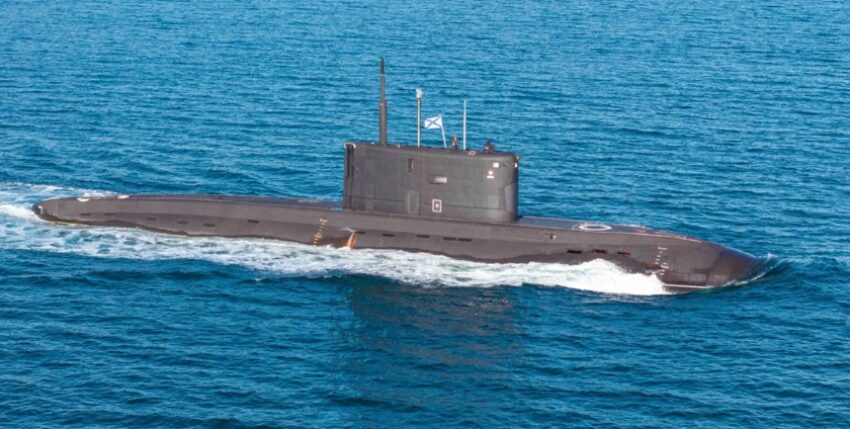The Russian diesel-electric submarine "Novorossiysk" (Project 636.3, Improved Kilo) has been making contradictory headlines since last weekend. While opposition Telegram channels from Russia are reporting a serious technical defect on board, including a fuel leak with a risk of explosion and a lack of spare parts, NATO observations on the European Atlantic coast have so far painted a different picture.
The "Novorossiysk" has been operating regularly in the Mediterranean since summer 2022, where it was stationed as part of Russia's operations against Ukraine and to secure its presence. After passing through the Strait of Gibraltar and its current transit through the Atlantic, it is expected to set course for the Northern Fleet, presumably in the direction of the Gadzhiyevo base on the Kola Peninsula.
The "Novorossiysk" had left its home base in Sevastopol in the Black Sea before Moscow's war in Ukraine began and was part of the Mediterranean Escadra until the end of the Russian base in Tartus/Syria. She returned to the Mediterranean in late summer 2024 after a lengthy refit in Kronstadt, starting in autumn 2022. According to the latest OSINT observations and official maritime sources, it is highly likely that the "Novorossiysk" is currently en route to its new base of operations at the Northern Fleet on the Kola Peninsula.
According to information from Western forces, the boat continued its transit independently after passing Gibraltar on 26 September, albeit at a comparatively slow speed. On Sunday, the "Novorossiysk" This is a decisive indication that there can be no question of an acute accident, as damaged boats generally avoid the risk of diving.
Fact check
There are no references to these events in Russian state media. RIA Novosti, TASS or the army newspaper Krasnaya Zvezda do not mention the transit and stick to the line of presenting naval operations abroad as a routine mission. Speculation about a technical emergency is only circulating in opposition channels. Russian military commentators in media such as Gazeta.ru refer more generally to the structural weakness of the navy: after the loss of the Syrian base in Tartus, the units deployed there lack logistical and technical contact points, which increases wear and tear, especially during longer transit journeys.
In Spain and Portugal, major daily newspapers were quick to pick up on the Telegram rumours, although military authorities reacted more cautiously. Although members of the Spanish Armada confirmed that the boat was being closely monitored by NATO units, a distress call had never been received. Portuguese observers also made it clear that no Russian aid ships or tugs were travelling towards the Atlantic. Although the conspicuously slow transit speed could be an indicator of technical limitations, it also corresponds to the normal operational profile of this type of submarine.
The British press took up the issue in a particularly pointed way. Newspapers such as The Telegraph or The Times reported on a "submarine in distress" off Portugal and used almost identical wording from the opposition Telegram messages. On the other hand, the assessments of the BBC and the UK Defence Journal out: Reference is made here in particular to the documented diving operation on Sunday, which suggests that the crew retained full control of their vessel. Experts such as Michael Setzer, President of the VDU, emphasise that a serious technical defect would generally rule out any planned descent and ascent.
Grabbing the headlines
The Norwegian Barents Observer finally summarised the controversy as an example of the dynamics of disinformation chains: An unverified rumour from an opposition Telegram channel became a major headline in southern European and British media, while confirmations are lacking. At the same time, the platform points out that the 636.3 class submarines may well be vulnerable after more than a decade of intensive use. Strategically, the transit of the boat towards the Northern Fleet is important anyway, as the Black Sea Fleet is severely weakened as a result of the war against Ukraine and Western blockades, and every transfer carries symbolic weight.
It is therefore clear that there is no evidence of a serious emergency on the "Novorossiysk". The boat remains under observation by NATO forces, but shows no external signs of an acute crisis.
Nevertheless, the incident is an example of the tense situation of the Russian navy, whose units without fixed bases in the Mediterranean are having to cope with increasingly long, risky repatriation voyages.
We wish the crew of the "Novorossiysk" a safe journey and an "uneventful" return home.








2 responses
Moin,
In the meantime, the press service of the Russian Black Sea Fleet reported on Monday, 13 October 2025, that the diesel-electric submarine of the Black Sea Fleet "Novorossiysk" ("Novorossiysk") has completed its scheduled stay in the Mediterranean and is on its way back, also passing through the English Channel in a surface position.
This can be read in the following reports: https://tass.ru/armiya-i-opk/25326359 and https://tass.ru/armiya-i-opk/25326679
Remember: Don't believe every "hot" news item published on social media channels...
Hello Mr Engel,
This article has been written and published precisely to make it clear to our readers that a "hot" report is by no means necessarily "true" news.
And precisely because so many "half-baked" things are written with a quick pen, hastily posted online and widely shared, we at marineforum try to write our articles only after a period of waiting and checking. We are certainly not the first to do so - nor do we want to be - but we are perhaps the most reliable and balanced when it comes to maritime information. At least that's the standard we set for our journalistic work.
Thank you very much if you continue to support us in this endeavour with corrective comments.
See you next time.
Axel Stephenson
Editorial team marineforum.online